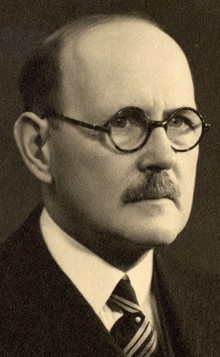
Allier is a department in the Auvergne-Rhône-Alpes region that borders Cher to the west, Nièvre to the north, Saône-et-Loire and Loire to the east, Puy-de-Dôme to the south, and Creuse to the south-west. Named after the river Allier, it had a population of 334,872 in 2021. Moulins is the prefecture; Montluçon and Vichy are the subprefectures. Its INSEE and post code is 03.

Ille-et-Vilaine is a department of France, located in the region of Brittany in the northwest of the country. It is named after its two main rivers, the Ille and the Vilaine. It had a population of 1,079,498 in 2019.

Loire-Atlantique is a department in Pays de la Loire on the west coast of France, named after the river Loire and the Atlantic Ocean. It had a population of 1,429,272 in 2019.

François Marie Tanguy Prigent was a French Socialist politician who became a resistance fighter during World War II (1939–45). He was Minister of Agriculture from September 1944 to October 1947 and was Minister of Veterans and War Victims from February 1956 to June 1957.
Robert Owen Paxton is an American political scientist and historian specializing in Vichy France, fascism, and Europe during the World War II era. He is Mellon Professor Emeritus of Social Science in the Department of History at Columbia University. He is best known for his 1972 book Vichy France: Old Guard and New Order, which precipitated intense debate in France, and led to a paradigm shift in how the events of the Vichy regime are interpreted.

Long before World War II, the various Breton nationalist organizations were often anti-French and anti-colonialist, opposed to the Central Government's policy of linguistic imperialism, and critical to varying degrees of post-French Revolution-style Republicanism. Some Breton nationalists were openly pro-fascist. The extent to which this led Breton nationalists into collaboration with the Axis Powers and their motivations, remains a matter of often bitter historical controversy and debate.

The de Rougé family whose former name was des Rues is a family of the French nobility from Anjou and dating back to the 14th century.

Henri-Auguste d'Halluin, known by the pseudonym Henry Dorgères, was a French political activist. He is best known for the Comités de Défense Paysanne which he set up in the interwar period.

The Fédération nationale des syndicats d'exploitants agricoles is a French umbrella organisation charged with the national representation of 20,000 local syndicat agricoles (agricultural unions)) and 22 regional federations.
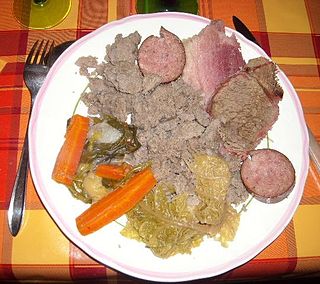
Kig ha farz is a cooked dish consisting of various meats simmered in a broth with a buckwheat flour based pudding. It is eaten traditionally in Brittany, more specifically around Léon in the region situated west from Morlaix to Brest. This dish, which is quite similar to a pot-au-feu, was once considered a dish for the poor and peasantry. The name in Breton literally means "meat and stuffing".

Auguste Alain Georges Pernot was a conservative French lawyer and politician. He was a deputy and then a senator before and during World War II (1939–45). He was Minister of Public Works in 1929–30, Minister of Justice in 1934–35, Minister of Blockade in 1939–40 and briefly Minister of the French Family and Public Health in June 1940. After World War II (1939–45) he was again a senator from 1946 to 1959. Throughout his career Pernot was a vocal pronatalist, pushing for government policies that would support the family and encourage higher birth rates to counter the demographic crisis in France. He believed that women should be encouraged to remain at home to raise children.

Pierre Caziot was a French agricultural expert and administrator who was Minister of Agriculture and Supplies in the Vichy government during World War II (1939–45). He was a strong believer in the value of the peasant-owned family farm, and promoted the "back to the land" policies of Marshal Philippe Pétain during the war.
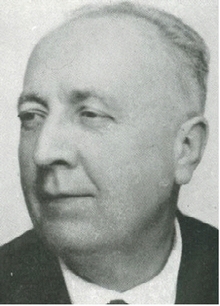
Jacques Jules Marie Joseph Le Roy Ladurie was a French agriculturalist and politician. He played a leading role in agricultural syndicates in the 1920s and 1930s. During World War II (1939–1945) he was Minister of Agriculture in Vichy France for several months in 1942. He later participated in the French Resistance. After the war he was a deputy for the Calvados from 1951 to 1955, and again from 1958 to 1962.
Louis Salleron was a French author, journalist and Catholic theoretician. He was right-wing, with monarchist sympathies, and an advocate of agricultural corporatism. During the early years of the Vichy Regime in World War II (1939–45) he played a leading role in establishing the Peasant Corporation. He continued to publish books and articles after the war, and was an outspoken opponent of the Vatican II reforms to the Catholic church.

The Peasant Corporation was a Paris-based organization created in Vichy France to support a corporatist structure of agricultural syndicates. The Ministry of Agriculture was unenthusiastic and undermined the corporation, which was launched with a provisional structure in 1941 that was not finalized until 1943. By then the small farmers and farm workers had become disillusioned since the corporation had maintained the privileged position of landowners and had not protected them from demands by the increasingly unpopular German occupiers. The corporation, which was never effective, was dissolved after the liberation of France in September 1944.
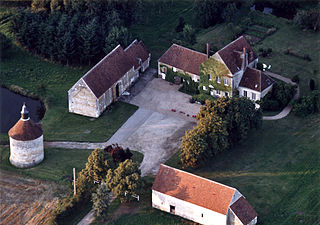
Joseph Aveline was a 20th-century French politician and agricultural expert from the Orne department of France, who served as mayor of Dorceau for a half century and, as parliamentary deputy, opposed full powers to Marshall Philippe Pétain in July 1940.

Hyacinthe de Gailhard-Bancel was a French politician, lawyer, and pioneer of agricultural syndicalism. He was Deputy of the Ardèche.
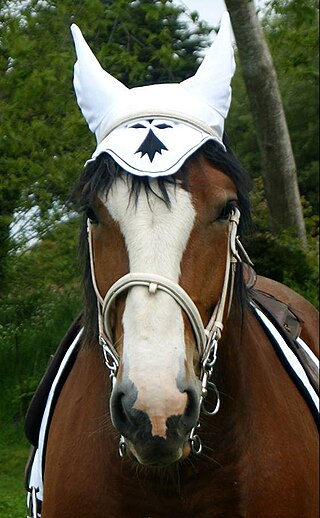
Horses in Brittany have a clear historical, economic and cultural importance, since their introduction often attributed to the Celts. In Brittany, the horse, generally a Breton bidet, was mainly used as a saddle animal until the middle of the 19th century. As roads improved, most breeders specialized in draft horses and carriage horses. They mainly settled in the west, in Basse-Bretagne, Trégor and Léon. The Breton draft horse, a renowned working animal, was exported in large numbers from Landivisiau in the early 20th century.
The Comités de Défense Paysanne or Peasant Defense Committees were agrarian militias founded by Henry Dorgères in France founded in 1929. It had an an "action squad" called the Greenshirts which was how his general movement was often known.
The Union nationale des syndicats agricoles (UNSA) was collection of French farming unions that was active in the 1930s. It had originally been called the Union centrale des syndicats agricoles (UCSA) but in 1934 changed its name to the Union nationale at the same time as Jacques Le Roy Ladurie, a landowner who had led the dynamic Calvados syndicat became secretary-general.
